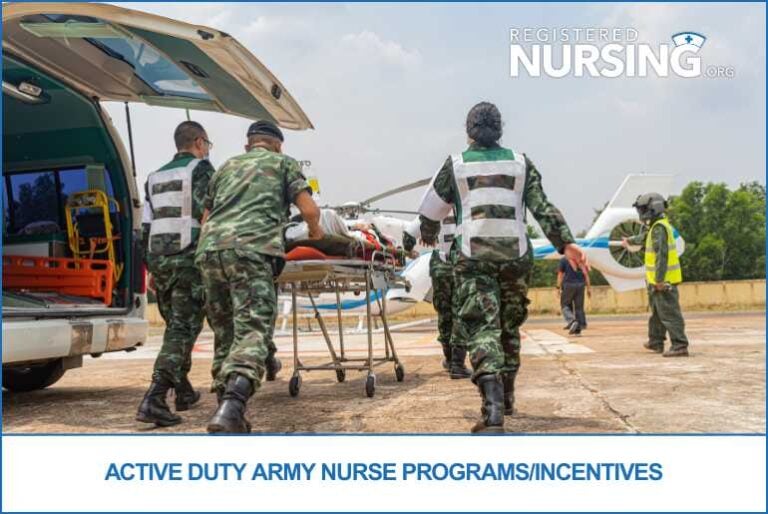Active Duty Army Nurse Programs/Incentives
- Why Become an Active Duty Military RN?
- Army Nurse Corps Overview
- Active Duty Nurse Programs
- Incentives and Benefits in 2025
- How to Become an Active Duty Army Nurse
- Career Growth and Specialties
- Is Active Duty Military Nursing Right for You?
- Step Into a Purpose-Driven Nursing Career
- Sources
- Latest Articles & Guides

Joining the ranks of active duty military nurses isn’t just a job choice—it’s a calling that merges clinical excellence with patriotic service. With a growing demand for healthcare professionals in both domestic and global missions, military RNs have become indispensable. According to the Bureau of Labor Statistics, the employment of registered nurses is projected to grow 6% from 2022 to 2032, faster than the average for all occupations. The military sector reflects this trend, offering a wealth of opportunities for nurses seeking career advancement, financial stability, and meaningful service.
As part of the broader military RN community, active duty Army nurses are uniquely positioned to lead, educate, and innovate in diverse healthcare environments. From humanitarian missions to combat care, these professionals make a tangible difference on a global scale. This guide explores the pathways, benefits, and career growth options available to those considering a career in active duty military nursing in 2025.
Why Become an Active Duty Military RN?
Military nursing offers a blend of clinical practice, leadership development, and global service that few civilian careers can match. Nurses who serve in the armed forces often gain specialized experience, travel extensively, and benefit from comprehensive education and financial incentives.
Key Benefits of Serving as a Military RN:
- Competitive pay and generous benefits
- Funded advanced education and certifications
- Structured leadership development programs
- Deployment opportunities around the world
- A strong sense of community and mission-driven service
Military RNs are more than caregivers—they are officers, educators, and change agents in military healthcare systems.
Army Nurse Corps Overview
The Army Nurse Corps, a vital component of the Army Medical Department (AMEDD), comprises commissioned RNs serving in active duty roles. These nurses work in clinical, administrative, and leadership capacities across Army hospitals, field units, and international missions.
Newly commissioned Army nurses typically enter at the rank of Second Lieutenant (O-1) and receive leadership training to prepare them for command responsibilities. Over time, many transition into advanced practice, research, or strategic planning roles.
Active Duty Nurse Programs
A variety of structured programs support the entry and development of active duty Army nurses. These pathways are designed to onboard new nurses, support degree completion, and prepare them for advanced roles.
Direct Commission Course (DCC)
The DCC is an initial training program for licensed RNs entering Army service as officers. It ensures that new nurses are equipped with the military knowledge and leadership skills necessary for success.
- Duration: 4-6 weeks
- Location: Fort Moore, Georgia
- Focus: Leadership, Army values, basic soldiering skills
Clinical Nurse Transition Program (CNTP)
New BSN graduates can transition into active duty nursing roles through this mentored clinical program.
- Duration: 10-12 weeks
- Sites: Army medical centers across the U.S.
- Mentorship: Supervised by experienced Army nurses
AMEDD Enlisted Commissioning Program (AECP)
Enlisted soldiers can become RNs by completing their BSN while remaining on active duty. AECP is endorsed and managed through AMEDD to help enlisted personnel advance into the nursing profession.
- Funding: Tuition, fees, and books covered
- Income: Continued active duty pay and benefits
- Outcome: Commission as an Army RN upon licensure
Graduate-Level Nursing Programs
For RNs seeking to move into advanced practice, leadership, or administrative roles, the Army offers fully funded master’s and doctoral education opportunities. These programs are delivered in partnership with top graduate institutions but are centrally coordinated through military education pathways.
- Cost: Covered by the Army, including tuition and required materials
- Support: Active duty pay and benefits continue during education
- Result: Qualify for roles such as Nurse Practitioner, Nurse Anesthetist, or Health Administrator
Program Comparison Table
| Program | Target Audience | Duration | Location | Key Benefit |
| Direct Commission Course (DCC) | New Army RNs | 4-6 weeks | Fort Moore, GA | Leadership training for new officers |
| Clinical Nurse Transition (CNTP) | New BSN Graduates | 10-12 weeks | Army Medical Sites | Mentored clinical onboarding |
| AECP | Enlisted Soldiers | Varies | Civilian Universities | BSN completion while on active duty |
| Graduate-Level Nursing | Licensed RNs | 2-3 years | Military/Partner Sites | Advanced practice or administrative roles |
Incentives and Benefits in 2025
The military offers one of the most robust benefits packages available in the nursing profession. In 2025, active duty nurses can expect significant financial incentives, education assistance, and personal support services.
Financial Incentives
Whether you’re entering as a new graduate or re-enlisting, military RNs may qualify for financial perks that outpace many civilian roles.
- Specialty Pay: Additional compensation for roles in anesthesia, ICU, or emergency medicine
- Retention Bonuses: Available for continued service in high-need specialties
- Loan Repayment: Up to $120,000 via the Health Professions Loan Repayment Program (HPLRP)
- Sign-On Bonuses: Up to $30,000 for eligible active duty RNs
Education and Career Advancement
Professional growth is a cornerstone of military nursing. Programs and incentives are structured to support lifelong learning and leadership.
- Graduate Education: Master's and doctoral degrees funded through Army partnerships
- Certifications: Expenses covered for national nursing certifications, such as those from AACN
- Leadership Development: Courses at every career stage, from officer training to command school
Lifestyle and Healthcare Benefits
Military nurses enjoy quality-of-life perks that help them thrive both professionally and personally.
- Base Salary: $44,000-$55,000 for new officers (higher with rank and years of service)
- Housing & Food Allowances: Tax-free BAH and BAS supplements
- Healthcare: No-cost care for service members; low-cost for dependents through TRICARE
- Retirement: Pension eligible after 20 years; Thrift Savings Plan (TSP) participation
How to Become an Active Duty Army Nurse
Joining the military as a nurse requires meeting specific educational and health standards. Once qualified, candidates go through a structured enlistment and commissioning process.
Basic Requirements
- U.S. citizenship
- BSN from an accredited nursing program
- Valid, unencumbered RN license
- Meet physical and background screening requirements
Enlistment and Commissioning Steps
Before joining, prospective military RNs should consult with a healthcare recruiter to clarify eligibility and goals.
- Consultation: Discuss aspirations and available paths
- Application: Submit documents, including transcripts and licensure
- Commissioning: Accept commission as Second Lieutenant (O-1)
- Training: Attend the Direct Commission Course and receive duty assignment
Career Growth and Specialties
Once on active duty, military nurses have many opportunities to specialize and advance. Each specialty offers unique responsibilities, training, and leadership paths.
Popular Army Nurse Specialties
- Emergency/Trauma Nurse: Care for combat injuries and acute conditions
- Perioperative Nurse: Assist in surgical procedures
- Nurse Anesthetist (CRNA): Provide anesthesia for military and civilian patients
- Family Nurse Practitioner: Deliver primary care in remote or base settings
- Public Health Nurse: Promote community health on installations and in missions
- Mental Health Nurse: Address psychological wellness of soldiers and families
Many nurses transition from clinical roles to senior leadership, research, or educational positions. Promotion follows a structured track from Second Lieutenant to Colonel and beyond.
Is Active Duty Military Nursing Right for You?
Choosing military service as a nurse is a deeply personal decision, and it’s not for everyone. However, those who thrive in structured, mission-driven environments often find it a life-changing experience.
Consider These Questions:
- Am I motivated by service and leadership?
- Can I commit to relocating and adapting to new environments?
- Do I want to advance my education without student debt?
If these resonate with you, the next step is to speak with an Army healthcare recruiter who can guide your journey.
Step Into a Purpose-Driven Nursing Career
Military RNs play an essential role in protecting the health and readiness of our armed forces. In return, they receive outstanding support, education, and career opportunities. Whether you’re just starting out or looking to elevate your current practice, active duty nursing offers unmatched rewards.
Take charge of your future with confidence. Your skills are needed, and your military nursing journey can start now.
Sources
- Bureau of Labor Statistics – Registered Nurses
- U.S. Army Medical Department (AMEDD)
- Health Professions Loan Repayment Program (HPLRP)
- AACN – American Association of Critical-Care Nurses
- TRICARE Military Health System
- Thrift Savings Plan (TSP)
- GoArmy AMEDD Recruiting
Latest Articles & Guides
One of the keys to success as a registered nurse is embracing lifelong learning. Our articles and guides address hot topics and current events in nursing, from education to career mobility and beyond. No matter where you are on your nursing journey, there’s an article to help you build your knowledge base.
Browse our latest articles, curated specifically for modern nurses.



